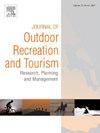From soft to hard adventure: Examining experienced mountaineers’ mountaineering intentions through the lens of the theory of planned behavior
IF 3.6
3区 管理学
Q1 HOSPITALITY, LEISURE, SPORT & TOURISM
Journal of Outdoor Recreation and Tourism-Research Planning and Management
Pub Date : 2025-02-26
DOI:10.1016/j.jort.2025.100865
引用次数: 0
Abstract
This study aims to reinterpret the theory of planned behavior (TPB) to understand why experienced mountaineers enjoy the activity. This TPB-based framework is appropriate for studying mountaineering, allowing for an examination of how experienced mountaineers perceive and transform difficulties into challenges that provide additional motivation. A questionnaire survey was conducted, and participants were recruited through mountaineering associations, fan websites, and social media. The study sent out 700 invitations and received 555 responses, resulting in a return rate of 79.29%. Partial least square structural equation modeling (PLS-SEM) was employed to test the hypotheses. The hypothesis testing confirmed several key relationships within the TPB framework as it applies to mountaineering. The study found that both social bonding and self-acceptance significantly contribute to attitude. Interestingly, self-acceptance emerged as a stronger predictor than social bonding, highlighting the importance of personal rewards and self-belief in the context of mountaineering. This finding aligns with existing literature suggesting that overcoming personal challenges is a critical motivator in adventure activities. This study makes significant theoretical contributions by extending the TPB to the context of mountaineering and provides valuable insights for the adventure tourism and mountaineering industry.
Management implications
This study offers valuable insights for enhancing mountaineering tourism by applying the Theory of Planned Behavior (TPB). The findings highlight that self-acceptance and social bonding significantly influence attitudes toward mountaineering, with self-acceptance being the stronger predictor. For outdoor recreation and tourism managers, this means.
- •Design programs that emphasize personal growth and self-belief, as these are key motivators for participants.
- •Promote social bonding opportunities to attract customers who value community and camaraderie.
- •Offer a variety of mountaineering activities, from soft adventures (e.g., casual hikes) to more challenging climbs, to cater to diverse skill levels.
- •Leverage marketing strategies that focus on the psychological benefits of mountaineering, such as personal achievement and social connections, to appeal to participants' intrinsic motivations.
- By aligning offerings with these insights, outdoor recreation and tourism operators can attract a wider audience, enhance participant satisfaction, and improve engagement in Taiwan's adventure outdoor recreation and tourism sector.
求助全文
约1分钟内获得全文
求助全文
来源期刊

Journal of Outdoor Recreation and Tourism-Research Planning and Management
HOSPITALITY, LEISURE, SPORT & TOURISM-
CiteScore
6.70
自引率
5.30%
发文量
84
期刊介绍:
Journal of Outdoor Recreation and Tourism offers a dedicated outlet for research relevant to social sciences and natural resources. The journal publishes peer reviewed original research on all aspects of outdoor recreation planning and management, covering the entire spectrum of settings from wilderness to urban outdoor recreation opportunities. It also focuses on new products and findings in nature based tourism and park management. JORT is an interdisciplinary and transdisciplinary journal, articles may focus on any aspect of theory, method, or concept of outdoor recreation research, planning or management, and interdisciplinary work is especially welcome, and may be of a theoretical and/or a case study nature. Depending on the topic of investigation, articles may be positioned within one academic discipline, or draw from several disciplines in an integrative manner, with overarching relevance to social sciences and natural resources. JORT is international in scope and attracts scholars from all reaches of the world to facilitate the exchange of ideas. As such, the journal enhances understanding of scientific knowledge, empirical results, and practitioners'' needs. Therefore in JORT each article is accompanied by an executive summary, written by the editors or authors, highlighting the planning and management relevant aspects of the article.
 求助内容:
求助内容: 应助结果提醒方式:
应助结果提醒方式:


